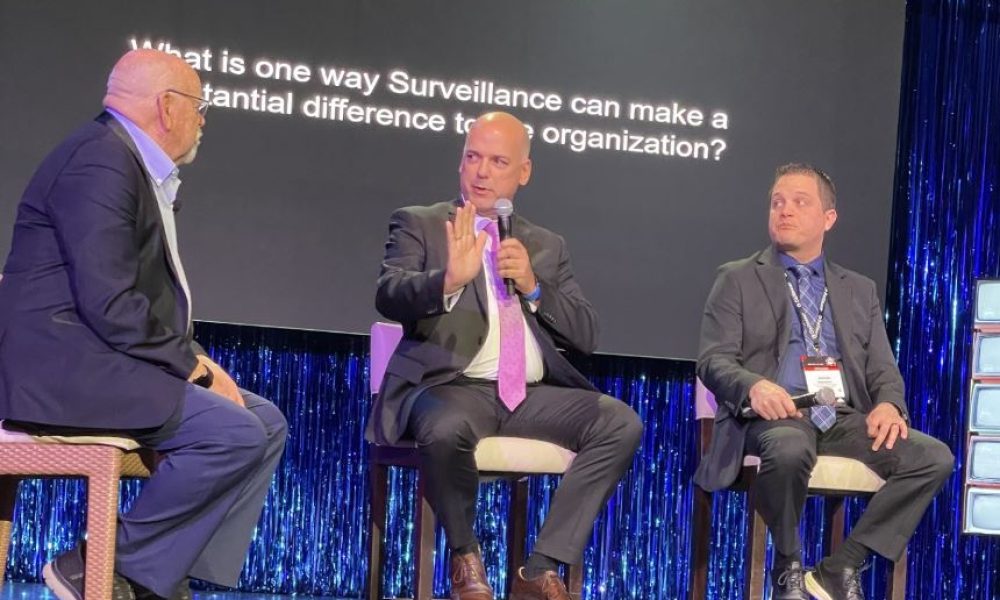As the casino industry continues to emerge from the pandemic, surveillance executives said the “threat landscape” is growing with scams, thefts, AI, and other technology.
The discussion among four surveillance executives Thursday morning at the World Game Protection Conference at the Tropicana Las Vegas was one of the most anticipated sessions, as casinos grapple with the latest threats to their customers and bottom lines.
Moderator Buddy Frank, a slot consultant and CDC Gaming columnist, asked how the threat landscape has changed since COVID.
“As we reopened after COVID, we saw scams more often,” said Jessie Beaudoin, vice president of surveillance and game protection for the San Manuel Tribal Gaming Commission at Yaamava’ Resort & Casino in Southern California. “We’re seeing the cheats and advantage players come out more often. I don’t know if they were waiting to come back out, but the threats are more frequent.”
Beaudoin said they’re also facing more sophisticated threats, including ransomware attacks by hackers. Scam artists are also calling cages pretending to be casino executives to abscond with money wired by cashiers.
“The scale of sophistication has increased,” Beaudoin said. “Someone in a different country can use AI to change their voice to do a (scam) call.”
Richard O’Donnell, chief surveillance and systems officer for Newport World Resorts (formerly Resorts World Manila), said they’re starting to see organized gangs come through. He showed a video of a group targeting a man to pick his pocket just outside the property.
David Norcutt, director of surveillance for Parx Casino properties, said while they haven’t had an increase in cheating scams on the East Coast, they’ve seen an increase in gang activity, with teams stealing from floats.
“We got hit two days ago for $17,000 on a float,” Norcutt said. “We’ve also seen an increase in internal theft with cashiers, especially in our food and beverage areas.”
Norcutt said scams are getting more complex with AI and the industry needs to find a way to combat them “by keeping up with the crooks and what they’re doing” and acquiring hardware and software and training staff to mitigate the threats.
Damian Phillips, who oversees global surveillance operations and projects for Melco Resorts and Entertainment, discussed China’s long lockdowns in Macau, thus the thievery hadn’t progressed to more advanced levels even into 2023.
“It was a very slow 2023 in terms of scams,” Phillips said. “Dealers were more interested in keeping their jobs than stealing money. It’s usually the other way around. It’s been about stealing the money and if I lose my job, I’ll get a job somewhere else.”
The surveillance executives were unanimous in their opinions that finding and retaining qualified employees, continue to be their biggest challenge. Many leave for jobs with better pay in other industries.
Phillips, who oversees casinos in Macau, Cypress, and the Philippines, added that another challenge is compliance. They use facial recognition at all of their properties with the expectation that they’ll see everyone who comes through the door.
“If a self-excluded person comes in and we let him gamble, we’re the bad guys,” Phillips said. “We failed. I’ve caught more heat from corporate for not getting the compliance stuff right than for missing a scam. They say okay, try harder next time (when it comes to scams). If we let a self-excluded player come in, we get a lot of heat, because they get it from the government.”
Beaudoin called on the industry to turn to data to lead them to crimes. That means crime mapping similar to what police departments do.
“We will look at the data on where crimes— ticket theft, chip theft, counterfeiting — are happening and dedicate resources to those. We’ll do audits or observations to try to stop the criminals by using the data to identify a crime trend. It’s about what time of the day and what day of the week the ticket thefts happen, so you can increase your staffing at those times rather than doing 24 hours seven days a week.”
Beaudoin said they also use subject-matter experts in slots, table games, and food and beverage to deal with problems in those areas.
Surveillance is about math these days, Phillips said. In Manila, they have hundreds of tables, but not enough agents to look at them all, so it’s important to harvest data and get alerts.
“My next challenge is interfacing the casino management system and getting all of that data coming up on the operator’s monitors,” Phillips said.
About a year ago, Beaudoin and his team started to look at new technology, such as analytics built into the camera network. That can alert surveillance to an issue, which is important, because situations can be missed by someone sitting in front of a monitor.
“I’m don’t believe that with these new technologies, you’ll see surveillance go away,” Beaudoin said. “They help enhance what we do, even with weapon detection. After the unfortunate incidents with active shooters, I’m surprised not more properties out there are screening every employee and patron for a weapon, as well as checking all luggage before it goes up into a room. I know some do, but I still hear about a lot of places that aren’t there yet.”
When he started working at the Tropicana Las Vegas 30 years ago, Norcutt said surveillance was about cheats at table games and people putting slugs in slots. Now it’s a whole range of issues. Tracking money laundering, risk management, food and beverage, and many others all impact a casino’s bottom line, he said.
“As AI comes in, along with more effective ways of cheating, we need to accept the change and train our staff and ourselves to think outside the box—just like criminals do,” Norcutt said. “We’re not just watching table-game procedures anymore. We’re everywhere.”



